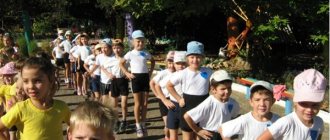Modern problems and prospects of preschool education article
In modern Russian society, as well as practically throughout the world, in recent years there has been an aggravation of problems associated with the upbringing, training and development of younger generations. Moreover, such problems are not only of a technical, technological or financial-economic nature, but rather of an essential nature, associated with the objective need to find new ways and means of organizing dialogue between generations, transferring accumulated cultural and historical experience, comprehensive improvement and development of human potential every country and every people.
Accordingly, at the present stage, the modernization of Russian education and improving its quality are considered inextricably linked with the solution of educational problems, with the creation of conditions for the most complete and harmonious realization of human potential, with the implementation of the principle of humanism. At the same time, the main goal of education, according to the Law of the Russian Federation “On Education,” is the formation of an individual who respects the rights and freedoms of other citizens.
All citizens of Russia, the family and parental community, federal and regional government institutions, local governments, the professional and pedagogical community, scientific, cultural, commercial and public institutions should become active subjects of educational policy.
Over the past 10 years, preschool education has gone through a difficult path of integration into new realities, which has significantly expanded the range of responsibilities of preschool institutions, which is aimed primarily at providing quality educational services. Preschool education in the context of the Federal State Educational Standard is prescribed as the level of general education at which the foundations of a social personality are laid in the education system as a whole.
The Federal State Educational Standard for preschool education establishes a number of requirements for the conditions for the implementation of the basic educational program of preschool education, primarily for psychological, pedagogical and personnel requirements. The key factor in the successful implementation of this Standard is still the teacher.
In a rapidly changing open world, the main professional quality that a teacher must constantly demonstrate to his students is the ability to learn.
The world is changing, children are changing, which, in turn, puts forward new requirements for the qualifications of a teacher. But one cannot demand from a teacher what no one has ever taught him. A way out of this situation could be a professional standard for a teacher, which should replace the obsolete documents that have previously regulated his activities. The main goal of which, first of all, is to liberate the teacher and give a new impetus to his development.
Consequently, the introduction of a new professional standard for a teacher should inevitably entail a change in the standards of his training and retraining in higher education and in advanced training centers.
A new vision of the quality of education should allow teachers to further model the educational process in accordance with new requirements, while preserving the positive developments in the theory and practice of preschool education, and make changes to the educational process.
But since the modern quality of preschool education is inextricably linked with the staffing level of preschool educational institutions, we recall the slogan of the 30s of the 20th century “Personnel decide everything!” - it is more relevant now than ever. It is the practicing teachers who will have to make the transition from the traditional educational process to an activity-based one.
Today, the main goal of working with teachers is to increase their professional competence and provide effective methodological support in the context of the introduction and subsequent implementation of the Federal State Educational Standard for preschool education.
To accomplish this task, the manager needs to improve personnel policies and carry out a set of measures to optimize the quality of education.
Today, managing does not mean giving directive instructions. It is necessary to change the strategy and attitude towards human resources, provide support to employees by inviting specialists to provide psychological prevention of emotional burnout, conduct business games, as well as scientific and methodological education (at specially organized discussion clubs, round tables, workshops), etc.
As a young leader, I believe that modern trends need to be introduced into education, and one should not be afraid to use the so-called “team building” - team-building, corporate events, for example, joint trips to the theater, going bowling, taking part in competitive sports games, etc.
Create schools for young teachers for the successful adaptation and retention of young staff not only within the institution, but also at the district level.
It is necessary to revive the tradition of mentoring in order to form a core personnel in preschool educational institutions.
And also apply various modern forms of strategic marketing that are useful for the manager and effective for the team, which will help create motivational readiness for new requirements.
Recently, in preschool educational institutions, consultations and pedagogical councils have been held for teachers aimed at improving the quality of education. The main issue in modern realities is the implementation of the Federal State Educational Standard.
Educational standards, as we see, are mandatory requirements, which poses certain tasks for institutions aimed at ensuring conditions for the implementation of the Federal State Educational Standard.
In order to be ready to work according to the Federal State Educational Standard tomorrow, today it is necessary to carry out a whole range of activities:
- Bring regulatory documents into compliance.
- To analyze the optimal distribution of human resources within a preschool educational institution, to determine the most effective use of the potential of senior educators, psychologists, speech therapists, foreign language teachers, experimental educators, to improve the quality of education in the network as a whole.
- Assess the readiness of preschool educational institutions for the new requirements of the modern education system.
And only then, as part of the modernization of the education system, will a modern teacher be able to create conditions for identifying and developing the full-fledged personal resource of each child, using a system-activity approach, which will teach the child the ability to see a problem from different sides, analyze many solutions, and isolate from a single whole components, and not just equip him with knowledge, but develop the ability and desire to learn throughout his life.
In order to fit into the modern rhythm, a teacher needs to continuously engage in self-development; this is currently one of the requirements of the Federal State Educational Standards.
The situation in the field of preschool education is changing qualitatively; over the past few years, most teachers have mastered innovative programs as part of their course training.
In order to form and develop teachers' skills in innovative and exploratory and experimental work, seminars, workshops, round tables, and master classes are regularly organized.
The participation of teachers in professional competitions and city events has increased.
An important role in developing the initiative of teaching staff is assigned to the manager, as an interested party in improving the quality of education of his institution.
A modern leader must not only be a competent manager, but also be an example, replicate the level of his achievements, creating a situation in which the team is interested in achievements and their own development in raising their status, both within the team and in the teaching community.
If the teacher himself is not successful and does not see prospects for development and his own growth, then the student will follow his example.
I would like to dwell in more detail on the development of interaction and participation of parents (legal representatives) of direct inclusion in educational activities.
Parents are now much more demanding, and we must not lag behind modern reality. Today we need to follow the development of society and information, try to be ahead, ahead of many processes, and be able to direct the active potential of parents in the right direction in a timely manner.
Working with the family is perhaps the most important aspect of organizing the educational process. In modern kindergarten conditions, it is impossible to do without support and mutual understanding.
One of the features of managing a modern kindergarten is that the head of a preschool educational institution is simply forced to involve various social institutions in solving the problems of the institution: parents, the public, otherwise he will not cope with the number of tasks in organizing the functioning of a modern educational institution
But we cannot look at the issue of working with parents one-sidedly, since in addition to improving material and technical conditions, parents are the first teachers for their children and in this aspect we see our partnership principles in the relationship between the preschool educational institution and the family. Including the joint creation of the “Development Program”.
As we already understand today, in order for parents to perceive education not only as a finished product, but to share responsibility in matters of raising children, it is necessary to actively include them in the development of the Development Program. The requirements for the development program themselves should be aimed at satisfying the request from three subjects of the educational process - the child, the teacher and the parents.
Thus, the preparation of preschool educational institutions for the transition to the Federal State Educational Standard of Preschool Education entails significant changes in the educational practice of preschool educational institutions. This process becomes an integral part of the modernization of education, which is currently a political and national task of Russian educational policy, aimed at ensuring the modern quality of education based on maintaining its fundamentality and compliance with the current and future needs of the individual, society and the state.



